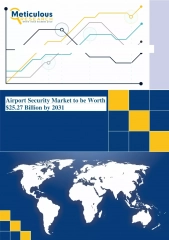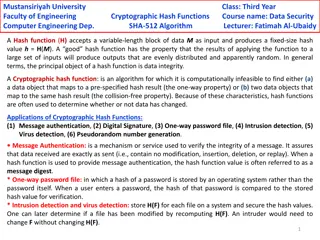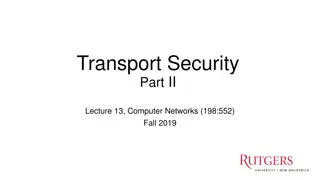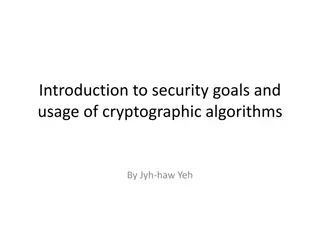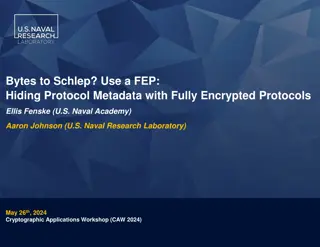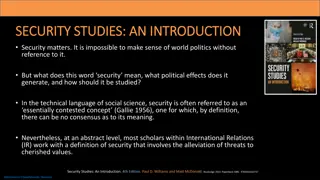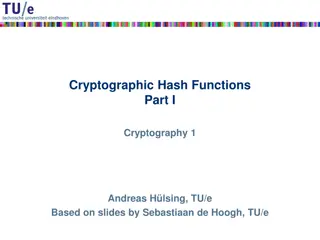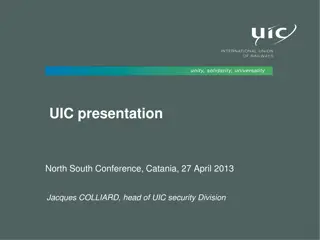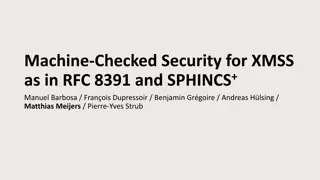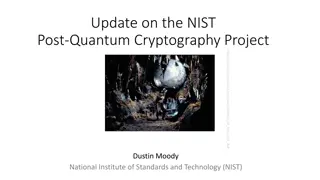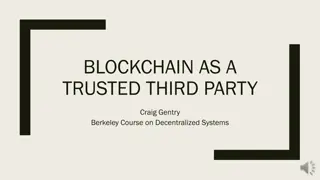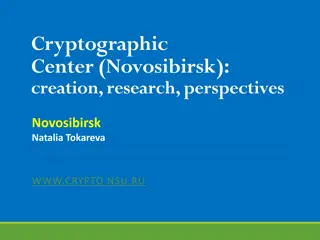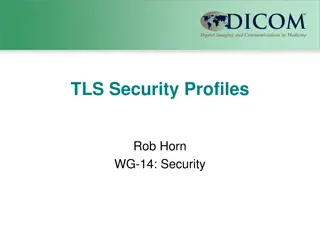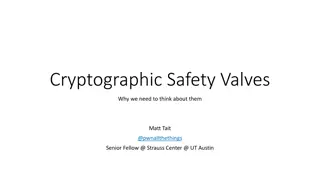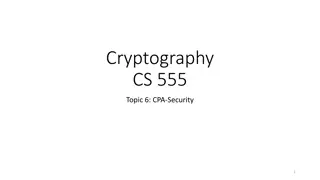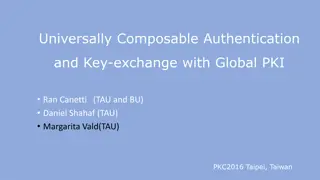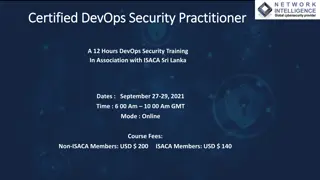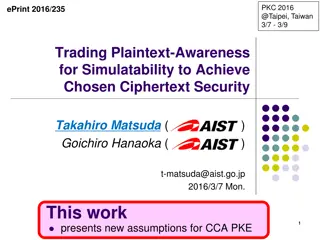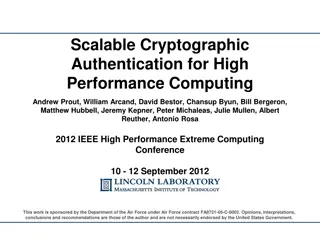Airport Security Market to be Worth $25.27 Billion by 2031
\u00ae, the airport security market is projected to reach $25.27 billion by 2031, at a CAGR of 8.6% from 2024 to 2031. Some of the major factors driving the growth of this market are stringent government regulations for airport security and the growing number of air passengers. In addition, increasi
6 views • 5 slides
KEERTHI SECURITY - Best Security Agencies In Bangalore
Keerthi Security is a security and facility management services provider in Bangalore. We are committed to offering top-notch security services for commercial and residential places. We aim to offer very secure and reliable security services to everyone. Our best-trained security guards are very sha
9 views • 11 slides
Sens Security Your Premier Personal Security Firm
In a world where personal safety cannot be taken for granted, Sens Security stands out as Melbourne's leading personal security firm. Our services are designed for those who demand the utmost in protection, whether you're a high-profile personality, a top executive, or an individual with unique secu
0 views • 6 slides
Sens Security Your Premier Personal Security Firm
In a world where personal safety cannot be taken for granted, Sens Security stands out as Melbourne's leading personal security firm. Our services are designed for those who demand the utmost in protection, whether you're a high-profile personality, a top executive, or an individual with unique secu
1 views • 6 slides
Sens Security Your Premier Personal Security Firm
In a world where personal safety cannot be taken for granted, Sens Security stands out as Melbourne's leading personal security firm. Our services are designed for those who demand the utmost in protection, whether you're a high-profile personality, a top executive, or an individual with unique secu
1 views • 6 slides
Cryptographic Reductions and Learning in Computational Complexity
This lecture explores the connection between computational complexity and cryptography, focusing on topics like pseudorandom functions, public-key cryptography, and learning from Gaussians. It delves into the implications of cryptographic reductions, lower bounds for learning MLPs, and the existence
0 views • 22 slides
Understanding the Role of Security Champions in Organizations
Security Champions play a vital role in decision-making concerning security engagement, acting as a core element in security assurance processes within a team. They foster a security culture, reduce dependency on the CISO, and promote responsible autonomy and continuous security education in the org
3 views • 13 slides
Understanding Cryptographic Data Integrity Algorithms
Cryptographic data integrity algorithms ensure data integrity, verifying data received matches what was sent by authorized entities. Cryptographic hash functions play a crucial role in ensuring data integrity through hash values. Applications include message authentication, digital signatures, and v
3 views • 41 slides
Understanding the Roles of a Security Partner
Learn about the roles and responsibilities of a Security Partner, including requesting changes to security roles, approving security requests, and initiating access requests. Explore the overview of Workday Security, the security access request process, and the pre-request process flow. Discover how
1 views • 17 slides
Cryptographic Hash Functions in Data Security: Mustansiriyah University Course Overview
Cryptographic hash functions play a crucial role in ensuring data integrity and security. This course at Mustansiriyah University's Faculty of Engineering covers the SHA-512 algorithm and its applications in various fields such as message authentication, digital signatures, and intrusion detection.
0 views • 6 slides
Understanding Transport Layer Security (TLS)
The lecture discusses key security properties essential for secure communication in computer networks, such as confidentiality, integrity, authentication, and non-repudiation. It elaborates on cryptographic mechanisms for achieving these properties and emphasizes modularity and reusability in implem
1 views • 26 slides
Understanding Security Goals and Cryptographic Algorithms
Introduction to security goals such as privacy, data integrity, authentication, authorization, and availability, along with the usage of cryptographic algorithms like symmetric and asymmetric key algorithms, keyed hashing, and digital signatures for achieving different security objectives in communi
0 views • 13 slides
Understanding Provable Security Models in Cryptography
Cryptography and cryptology involve secure communication techniques to protect data from third-party adversaries. This article introduces provable security models, cryptographic goals like confidentiality and authenticity, and the approach of security by trial-and-error versus provable security meth
0 views • 48 slides
Insights on Environmental Security and Ingenuity
In this tribute to Ran Canetti, insights are shared on environmental security, ingenuity, and secure multi-party computation (MPC). The discussion delves into the essence of ingenuity, addressing why some may misunderstand discoveries. Furthermore, the concept of environmental security and its pivot
0 views • 11 slides
Securing Protocols with Fully Encrypted Protocols (FEPs)
In this research presented at the Cryptographic Applications Workshop, Ellis Fenske and Aaron Johnson address the challenges of Fully Encrypted Protocols (FEPs). They highlight the lack of precise understanding, formalized goals, and proven security in existing FEPs. The work introduces new security
0 views • 29 slides
Enhancing Cryptographic Key Generation with High-Quality Randomness
This presentation discusses the critical aspect of ensuring high-quality randomness in cryptographic key generation processes. It explores key vulnerabilities and common failure modes, emphasizing the importance of incorporating strong randomness. The content delves into various methods and issues r
0 views • 45 slides
Understanding Security in World Politics
Security studies delve into the intricate processes of defining and addressing security threats in global politics. It explores the contested nature of security definitions, emphasizes the political significance of security, and challenges the conventional boundaries of International Relations. The
0 views • 8 slides
Comprehensive Course Review: Security Research Cornerstones at Carnegie Mellon University
Dive into the essential topics of software security, network security, OS security, and cryptography in the course offered by Vyas Sekar at Carnegie Mellon University. Explore control flow hijacks, cryptography terminology, and the importance of network security in protecting data transmissions. Lea
0 views • 41 slides
Understanding Cryptographic Hash Functions
Cryptographic hash functions play a crucial role in various aspects of security, including integrity protection, checksum generation, password hashing, digital signatures, and more. They are designed to efficiently convert input data of arbitrary length into fixed-length output, aiding in tasks like
0 views • 32 slides
UIC Security Division Overview and International Activities
The UIC Security Division plays a crucial role in supporting the security platform of the International Union of Railways (UIC). Headed by Jacques Colliard, the division is based in Paris and consists of key personnel like Marie-Hélène Bonneau, Jos Pires, and Laetitia Granger. The division's activ
0 views • 12 slides
Enhancing Security for XMSS and SPHINCS+ Using Machine-Checked Methods
Advanced cryptographic techniques such as XMSS and SPHINCS+ are critical for ensuring secure digital signatures in a post-quantum world. This project focuses on improving the security and verification processes of XMSS and SPHINCS+ using machine-checked methods, aiming to enhance trust in these cruc
1 views • 17 slides
Cryptographic Algorithms and Hash Collisions Overview
Explore the world of cryptographic algorithms and hash collisions. Learn about various hashing algorithms like MD5, SHA-1, SHA-256, and more. Dive into the concepts of symmetric and asymmetric key algorithms and understand the risks associated with hash collisions. Discover the implications of post-
0 views • 58 slides
Franco-Japanese Cybersecurity Workshop Highlights and Future Plans
The 5th Franco-Japanese Cybersecurity Workshop concluded with insightful discussions on key areas such as IoT security, AI, hardware security, and supply chain security. The steering committee members shared plans for the 6th workshop in France, emphasizing policy discussions and cross-cutting issue
0 views • 18 slides
Understanding Quantum Computing and Its Impact on Cryptography
Quantum computing utilizes the principles of quantum mechanics to process information exponentially faster than classical computers. This advancement poses a significant threat to current cryptographic systems, especially those reliant on factors like RSA and Diffie-Hellman key exchange. If large-sc
0 views • 25 slides
Automating Security Operations Using Phantom
Isabella Minca, an intern for 4 months in the Security Team at Adobe, presents an overview of automating security operations using Phantom. The presentation covers goals, security alerts, Phantom playbooks, handling security data, and the capabilities of Phantom in orchestrating security responses.
0 views • 28 slides
Exploring the Role of Blockchain as a Trusted Third Party in Decentralized Systems
Blockchain technology serves as a decentralized and cryptographic Trusted Third Party (TTP) by enhancing trust, immutability, and censorship resistance in transactions. By distributing trust and utilizing cryptographic protocols, blockchain mitigates the need for a centralized authority, offering a
0 views • 30 slides
Cryptographic Center in Novosibirsk: Advancements in Cryptography and Research
The Cryptographic Center in Novosibirsk, established in 2011, focuses on advancing cryptography through research, education, and international collaborations. With a team of researchers and students, the center explores various aspects of cryptography, including cryptographic Boolean functions, ciph
0 views • 33 slides
Network Security Course Overview - INFSCI 1075 by Amir Masoumzadeh
Network Security Course INFSCI 1075 by Amir Masoumzadeh focuses on security issues in networks, covering common attacks, prevention, detection, protocols like IPSec and SSL/TLS, cryptographic protocols, and more. The course prerequisites include knowledge of TCP/IP, algebra, digital logic, and basic
0 views • 16 slides
Evolution of TLS Security Profiles and Best Practices
TLS security profiles have evolved with the introduction of new profiles, retirement of old ones, and emphasis on non-downgrading best practices. Motivated by changes in security threats and cryptographic methods, the IETF has issued recommendations to ensure secure connections using TLS 1.2. The ne
0 views • 5 slides
Faster Implementation of Modular Exponentiation in JavaScript
Development of a cryptographic authentication toolkit for web application developers. Discusses modular exponentiation, digital signatures, elliptic curve cryptography, and the importance of DSA in providing secure authentication. Aims to offer both classical and elliptic curve cryptographic solutio
0 views • 22 slides
Understanding the Importance of Cryptographic Safety Valves in Legislation
Legislation regarding cryptographic safety valves is impending, with potential implications on privacy and security. Matt Tait discusses the need to analyze risks and consequences, emphasizing the importance of transparent and secure safety valves. The debate surrounds decryption requirements for da
0 views • 17 slides
Understanding HTTP Security Headers for Web Apps
Explore the importance of HTTP security headers on web applications through a detailed breakdown of headers like HSTS, XFO, XSS, CSP, CTO, RH, and FP. Learn how these headers enhance security by instructing browsers on handling website content, preventing various attacks. Gain insights on configurin
0 views • 68 slides
Zeroizing Attacks on Cryptographic Multilinear Maps: Overview and Applications
Cryptographic multilinear maps (MMAPs) enable computations on encoded secret data, offering similarities to fully homomorphic encryption (FHE) while providing distinct features. MMAPs find applications in identity-based encryption, non-interactive zero-knowledge proofs, and more. The evolution of MM
0 views • 45 slides
CPA-Security and Multiple Message Security in Cryptography
Today's goal is to build a CPA-secure encryption scheme focusing on multiple message security. The concept of indistinguishable multiple encryptions against eavesdropping attackers is explored, highlighting the importance of secure encryption schemes in the presence of an eavesdropper. The experimen
0 views • 22 slides
Understanding Cryptographic Protocols and Key Exchange
This content delves into the world of cryptographic protocols, discussing the importance of security measures such as symmetric cryptography, hash functions, and public-key cryptography. It explores the field's various studies, goals, Diffie-Hellman key exchange, and the significance of key size in
0 views • 28 slides
Modular Security Analysis for Key Exchange and Authentication Protocols
Explore the modular security analysis approach used to examine the security of key exchange and authentication protocols, focusing on the universally composable authentication with a global Public Key Infrastructure. The analysis involves splitting the system into smaller components, separately anal
0 views • 15 slides
Comprehensive DevOps Security Training Overview
This Certified DevOps Security Practitioner course provides a deep dive into implementing DevSecOps, integrating security into the DevOps processes. Covering topics like security testing, Docker security, automation, and more, the training aims to equip participants with the necessary skills to embe
0 views • 5 slides
The Necessity of Secure Distributed Security Policies
The presentation by Joseph Bonneau at the Web 2.0 Security & Privacy event in San Francisco delved into the importance of secure distributed security policies. Addressing threats, cryptographic attacks on HTTPS, vulnerabilities in practice, control aspects, HTTPS stripping, and rogue certificates, t
0 views • 34 slides
New Assumptions for Achieving Chosen Ciphertext Security in Cryptography
This research work focuses on presenting new assumptions for achieving chosen ciphertext security in public key encryption. The study aims to clarify the necessary and sufficient assumptions to realize general cryptographic primitives, particularly focusing on CCA secure PKE and KEM. The ultimate go
0 views • 27 slides
Scalable Cryptographic Authentication for High Performance Computing
This work discusses the scalable cryptographic authentication approach developed by Andrew Prout and team for high-performance computing. The LLGrid system architecture, challenges with interactive supercomputing, and utilization of LLGrid for various computing tasks are explored, highlighting the i
0 views • 34 slides
